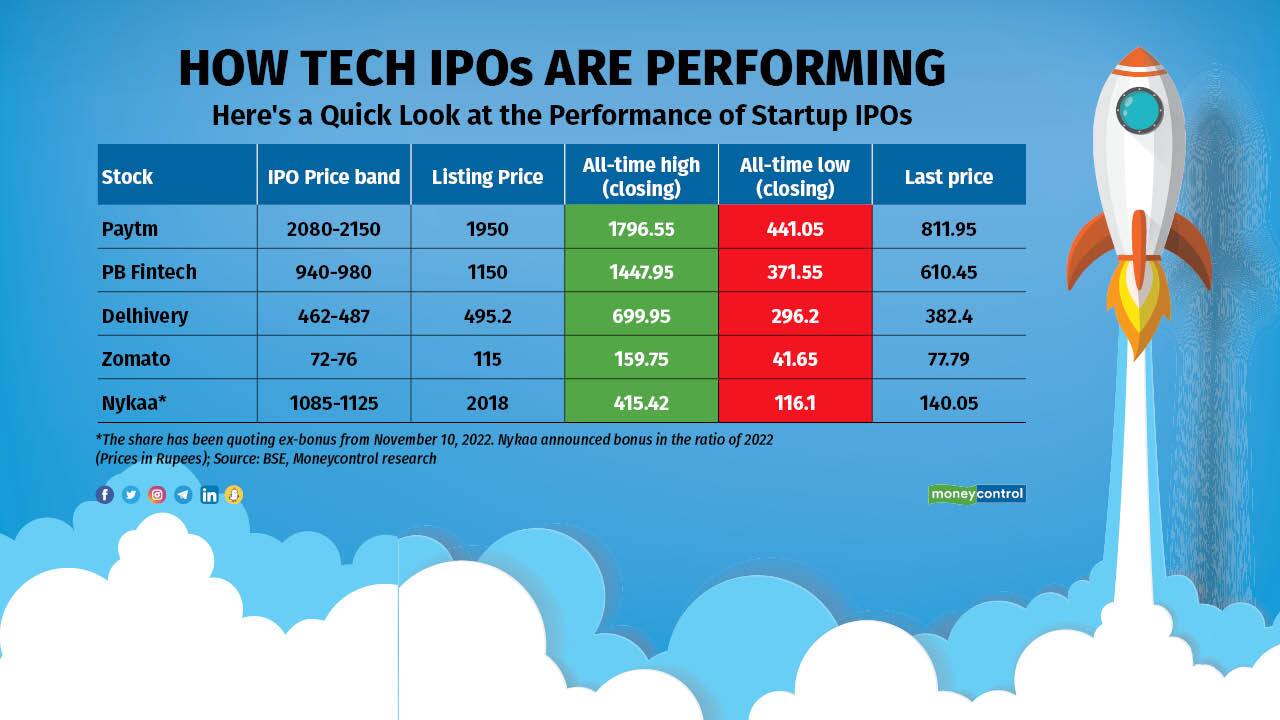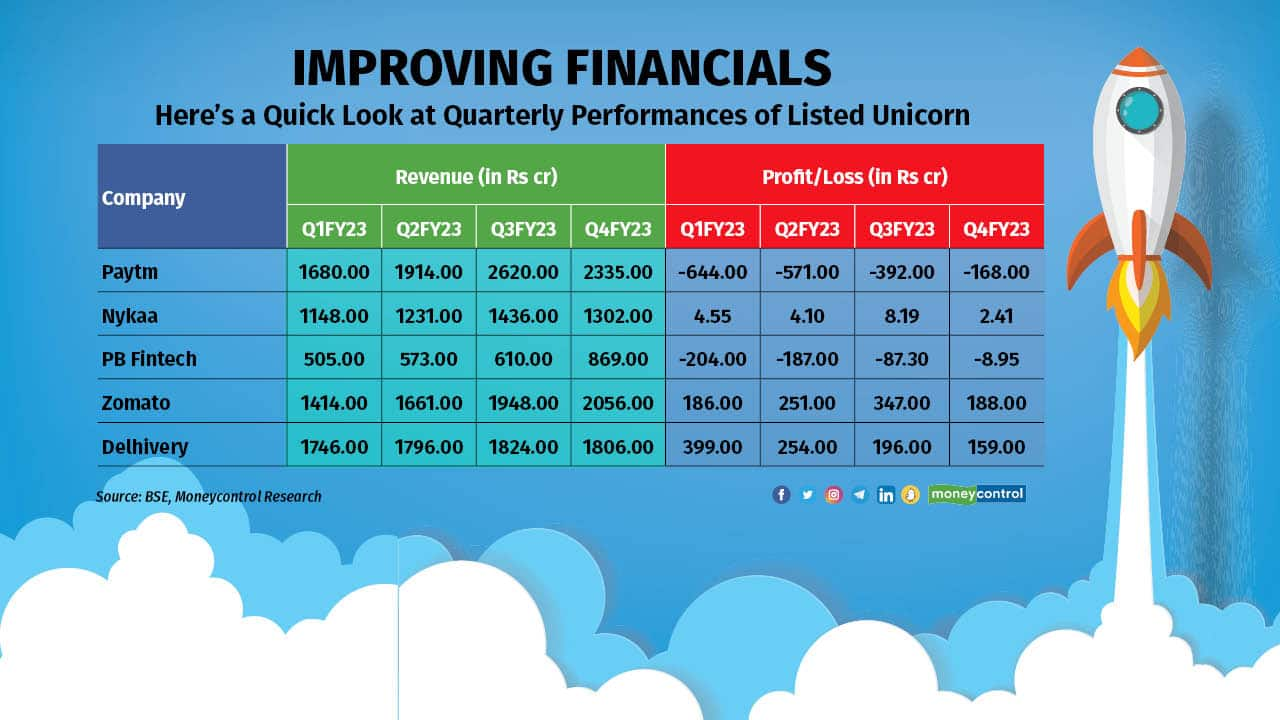



India's thriving stock market has failed to witness any IPOs (initial public offerings) from VC-backed tech startups as companies and investors are hesitant to take loss-making ventures public due to past public shareholder responses.
Over the past year, the number of venture capital (VC)-backed unicorns going public in the country has been limited. One notable example is Five Star Business Finance. But it stands out from other unicorns in the market as it is a 40-year-old traditional non-banking finance company (NBFC) and has been profitable, unlike most VC-backed startups, which are very new and have massive losses.
Despite overall IPO activity remaining stable and India’s benchmark indices being near all-time highs, the majority of VC-backed ventures have experienced delays in their plans to go public, unlike the 2021 stock market boom, which attracted as many as four big IPOs. For instance, API Holdings, parent of online pharmacy platform Pharmeasy, withdrew its IPO plans citing market conditions and ‘strategic considerations.’
Another unicorn, SoftBank-backed Firstcry, has been looking to go public since last year, but has not filed its draft papers with the Securities and Exchange Board of India (SEBI) yet.
In the last six months, Honasa Consumer Ltd, the parent company of Mamaearth, is the sole VC-backed unicorn to have submitted draft papers to SEBI. While Moneycontrol reported that Ola Electric has kicked off IPO discussions with investment banks, the talks are in fairly early stages, with no specific timeline yet.
In addition, prominent unicorns such as OfBusiness, Pine Labs, Ola Cabs, Byju’s, PhonePe, and Unacademy have expressed intentions to go public by 2023 or 2024 while securing substantial funding in 2021.
However, following the IPOs of Zomato, Paytm, PB Fintech and others, companies have begun to understand that public shareholders have different perceptions of their businesses and valuations as compared to private investors, and the initial enthusiasm surrounding their IPO plans has faded.

“When a PE investor wants an exit, he is going to ask for a premium (valuation) so that he can exit at every level and for him to demand that premium, you need that euphoria, and that seems to be absent from the market currently even as the overall sentiment stays robust,” says AK Prabhakar, Head of Research at IDBI Capital Markets.
According to Prabhakar, public shareholders also expressed concern regarding the primary motivation behind these IPOs (in 2021), as it appeared that the main driving force was the exit motives of private market investors rather than a genuine desire for the businesses to grow, which was not well-received by public market investors, who value sustainable growth and long-term potential.
“The concept of PE exits is something that investors did not like. Even after listing, these PE investors are regularly exiting. You take the case of Nykaa, Paytm, many other companies… regular exits are there and that’s why you are not getting back the price and that is also worrying investors,” says Prabhakar.
“This was the first batch coming from the startup space and so there was euphoria around it initially. But people had a bad experience, so now similar excitement will take time,” he adds.

This realisation, along with the fact that public investors gauge businesses on different metrics, prompted many companies to reassess their strategies and shift their focus towards aligning with the metrics valued by the stock markets. Industry experts believe that these tech IPOs are still approximately 18 months away, indicating that further preparations and adjustments are necessary before going public.
“Companies can’t say that I will show profitability in the next three years and attract public investments, which probably was the case 18 months back (when Paytm etc IPOed). Many companies that filed IPO papers or were close to filing IPO papers realised that they will take at least three years to achieve profitability,” says Ashsish Kumar, Managing Partner at Nandan Nilekani’s Fundamentum Partnership, an investor in Pharmeasy.
“So now these companies are focusing on accelerating this timeline (profitability) and looking to achieve profitability first rather than going public. It is also not just about being profitable; companies would have to show they can expand profitability and thus I think it is an 18-24 month journey for most before they can go public,” Kumar adds.
Profitability in focusKumar's perspective is valid. Many VC-backed technology companies that went public in 2021 had massive losses on their balance sheets, which led to concerns from public shareholders regarding their ability to achieve profitability.
Subsequently, unicorns such as Zomato, Paytm and PB Fintech have taken measured steps to become operationally profitable and reach break-even. As a result of their efforts, these companies have presented stronger financial figures in recent quarters, leading to an increase in their share prices in the recent past.

In light of this, venture capital and private equity investors have begun actively encouraging their portfolio companies to focus on enhancing their unit economics and establishing a clear roadmap to profitability, recognising the importance of sustainable financial performance. Investors are also guiding their portfolio companies in achieving long-term viability before thinking of going for an IPO, according to industry observers.
“There has been pressure on startups to get their unit economics right. They are working on it but it will take time,” says Shyam Sekhar, Chief Ideator at ithought Advisory.
“VCs are not going to give up on their ventures. They are definitely going to do whatever it takes to protect their capital and get an exit and all of this will actually help the companies also, I don’t doubt that. So, these companies would have to get the basics right before they think of an IPO and VCs are telling them to do that. Also because if they get it right, they will be able to get the valuation they and the VCs want,” he added.
Corporate governance issuesIn addition to profitability concerns, a series of corporate governance lapses in Indian startups has caused both private and public market investors to exercise caution, industry insiders said. These instances have raised doubts about the adherence to sound corporate governance practices within these companies.
Since the start of 2022, startups such as BharatPe, Trell and Zilingo have come under fire for alleged breaches of corporate governance practices. While in the case of BharatPe, its co-founder and Managing Director was ousted, in the case of Zilingo, its co-founder and CEO was sacked.
Prabhakar says public shareholders do not take such instances lightly and thus would be wary of investing in startups, especially due to repeated instances of such breaches.
Furthermore, startups have faced criticism for their methods of recognising revenue and losses, drawing attention to potential accounting irregularities or questionable practices. For instance, Byju’s was advised by its auditor, Deloitte, to change its revenue recognition method, which led to the company deferring 40 percent of its revenue to subsequent quarters.
These factors have contributed to a heightened sense of scrutiny and wariness among investors regarding the overall governance and financial practices of startups in India, according to Prabhakar of IDBI Capital.
“There are corporate governance issues at most of these companies, which were in the news, and this will certainly play on public investors’ minds. We also did a study; except for Nykaa, none of the startups have significant promoter holding. This suggests that these are professionally run companies without (promoter) skin in the game,” says Prabhakar.
“That’s also something for the investors to think. ‘There’s no promoter then why is this valuation so expensive? Am I being sold by all these PE investors who just want to exit,’ is something public investors are thinking,” he added.
As startups reevaluate their IPO plans, it will be intriguing to observe the distinct approaches companies adopt in their preparations for a public listing. Unlike in 2021, when loss-making unicorns went public, there is now a precedent that companies can learn from. It is not clear when India's market will once again open its doors to tech IPOs, and only time will reveal the timeline for such opportunities.

Discover the latest Business News, Sensex, and Nifty updates. Obtain Personal Finance insights, tax queries, and expert opinions on Moneycontrol or download the Moneycontrol App to stay updated!
Find the best of Al News in one place, specially curated for you every weekend.
Stay on top of the latest tech trends and biggest startup news.